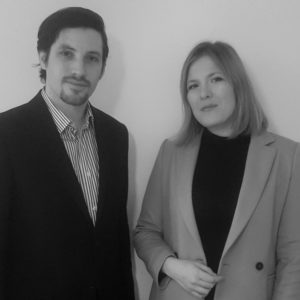

Sébastien Lachaussée & Elisa Martin-Winkel
Developing a Film in France
Development is a crucial step when producing a feature film. It is the period when take place both the writing and artistic development of the films by its authors and the search of financial partners by the producer (co-producers, broadcasters…). As part of the development of a feature film, it is necessary to first ensure the legal certainty of the project before seeking any external funding for the project.
LEGAL CERTAINTY OF THE PROJECTS IN DEVELOPMENT
Development is a delicate phase of a project: relationships between authors and producers are arising and it is important to clearly establish the conditions under which the project will evolve.
Relationships between authors and producers
A producer who wishes to invest his resources (both human and financial) in the development of a film must ensure that his relationship with the author is well established and that he will be able to acquire the rights of the authors pertaining to the project.
To that extent, it is essential that the producer enter into a contract with the author(s) regarding the writing of the project and the assignment of the author’s rights to the producer. The form and content of such contract depend on the characteristics of the project and the writing stage of the project.
Notably, it may be for a producer to acquire an option regarding the assignment of such author’s rights or command further writing works to the author within the development of the film.
An option is a unilateral promise to assign the rights of a project to the producer who has declared interest. It then allows the producer to reserve the rights during the period necessary for the development (scenario writing, search for financing, etc.) of the project and to secure its position while limiting its financial risks.
The option agreement must include: the option term including any possible renewal, the option price (which remains in any case acquired to the author to compensate the immobilisation of the rights but which may constitute all or part of the guaranteed minimum on the remuneration in the event of the exercise of the option), the rights, the exclusive nature of the option and a guarantee of ownership of the rights by the author and/or assignee. In order to avoid subsequent negotiations, it is also interesting to annex to the option the assignment of rights applicable if the option is exercised
When ordering writing works to an author, it is necessary to determine both the conditions of writing and those of the assignment of the rights of the author to the producer. It is particularly important to establish a writing calendar, the conditions and modalities of acceptance of the works, the addition of co-authors…
If an author-director carries out the project, it is also interesting to conclude an option or assignment of rights regarding his/her director’s rights. The case maybe, it is wise to negotiate the remuneration of the director as a film technician in the event of the film is produced.
Finally, in the context of audio-visual adaptation, it is essential to take into account the rights of the author of the first work. If the work is not in the public domain, it is necessary to look for the owner of the adaptation rights: publisher, producer and, more rarely, the author and to conclude with the latter an option or assignment contract.
Relationships between producers and broadcasters/distributors
As part of the development of a project a producer can meet and work with different partners. Their relations within the framework of the project need to be clearly formalized. Again, the form and content of the agreement depend on the characteristics of the project.
In particular, it is possible for producers to decide to develop a project together, working together more or less closely. Such co-development relationship shall be the subject of a co-development agreement setting forth the rights and obligations of the parties. This includes determining the resources provided by each co-producer and the corresponding counterparts. It is important to be precise about the decision-making process, especially when it comes to launch the production of the film.
A producer with a more advanced project will generally choose to directly propose a co-production to its partners. It will then be necessary to establish the relations between the parties in a deal memorandum of coproduction providing the rights and obligations of the co-producers at this stage of the production. A complete co-production agreement shall be established at a later stage, when the film financing is entirely gathered.
Finally, during the search for the film financing, producers are brought to work with television channels and film distributors. As regards with the channels, producers will generally conclude a presale of the broadcasting rights of the film, but a coproduction remains possible. Within the frame of the film distribution, if a distributor is involved in the film, a deal memorandum of distribution agreement and/or international sales must be drawn up, including the financial conditions and the extent of the rights assigned to the distributor. It is understood that a detailed contract shall be concluded later.
FINANCING A FILM DEVELOPMENT
The development of a project entails various costs for the producers (option and transfer contract, order of works, …) and it can be difficult to finance emerging projects. Nevertheless, both the CNC and the French regions offer dedicated aid to authors and / or producers. In addition, it is possible to resort to collective management organizations.
Before going into more details, it is to be highlighted that in the context of the development and financing of a project, it is necessary to take into account the incompatibilities between certain aids, and to choose wisely the most interesting according to the characteristics of the project. It should also be recalled that the total amount of public aid can not exceed 50% of the final cost of the film or, in the case of international co-production, of the French participation, except for difficult or low-budget works that benefit from derogations.
CNC’s support
The French CNC offers many aids for the writing and development of feature films intended for authors and/or for production companies. Scenario support mechanisms (aid for the creation, writing and rewriting aids) and development support are available.
The aid for the creation supports the authors in a very early phase of the project, so the application form should only include a project presentation and a letter of intent for its development. The maximum amount is € 10,000. However, this support is only available to authors who have already written or co-written a long feature film that meets certain conditions.
An author can also submit is application for the writing aid. This scheme is available for non-completed projects submitted in the form of a synopsis or a film treatment. The maximum amount is € 30,000
Finally, the re-writing aid is available for scenarios that require further writing work. The author or producer may file the application. The maximum amount per project is € 21,000.
In addition, producers can apply for development aid to finance this phase of production. This is a dual scheme: a « program support » for the most active companies (delegate production of at least 3 French feature films in the four previous years before the application) and a scheme for to other eligible companies. It is important to highlight hat the number of projects supported is limited to four simultaneous projects for program support companies and two for the others companies Additional schemes exist notably regarding films co-developed by at least two eligible companies or if the project include the creation of an original sound track.
It is understood that in any case, the support granted for pre-production cannot exceed 50% of the relevant expenses (adaptation rights, rights on the scenario, original soundtrack…° and cannot exceed € 70,000 per project. Development aid is selective and refundable if the film enters into production: 50% on the first day of shooting and 50% at the theatrical release. A supplementary lump sum is allocated in the form of a grant, its amount varies according to the specificities of the project.
Finally, depending on the project specificities, it is possible to apply for specific support from the CNC (Fonds Images de la diversité support for development of French-German or French-Italian cinematographic films).
Regional supports
Many French regions offer aids for the development of feature films and can be considered according to the specificities of the project. We cannot provide a complete list but a few examples are interesting.; Aquitaine, Ciclic Val de Loire, Maison de l’image en Basse-Normandie, writing scheme in Rhône Alpes (4000 €) …
To give just one example: the Ile de France region provides scriptwriting aid to support authors and their producers. The aid consists of a subvention for the author, the amount of which is determined according to the project (short, medium or feature film) and the duration of the workshops-meetings (from € 5,000 to € 20,000) and assistance to the hosting structure (up to € 5,000). It is understood that scenario already written are not eligible.
Collecting society supports
Some French collective management companies offer some support for the writing and development of feature films. This is particularly the case of SACD for the authors and of Procirep for production companies.
The SACD, in collaboration with the Fondation Beaumarchais, offers a support with feature film writing. This grant is a lump sum of 5 000 €, divided as follows : 4 600 € for the author and 400 € of social contributions paid for the author. To be submitted a project must be developped accordingly the applicationform shall gather a complete synopsis, 12 to 20 pages of dialogue and a letter of intent.
The Procirep offers a support with feature film writing and development, granted to eligible productions companies. It is understood that this aid is intended only for independent French film production companies whose production activity is established. It benefits each year to about 80 production companies. An application can gather up to 3 projects and the amount of the aid varies between 12000 and 45 000 € and is dtermined in compliance with the expenses incurred by the producer on all the projects.
It can also be noted that foundations and private organizations also support the development of film projects, like the Lagardère Foundation.
As part of the development of a feature film, it is necessary to first ensure the legal certainty of the project, the problems vary according to the projects and it is wise for a producer to consult wit a specialized lawyer who will study the risks related to the project and will draft and negotiate the necessary agreements for its production.
SHARE THIS ARTICLE
CONTACT
OUR OFFICES
INFORMATION
sl@avocatl.com
PHONE
+33.1.83.92.11.67
Address
121, boulevard de Sebastopol
75002 Paris
5th floor / Staircase A
Follow us :
Newsletter
Please enter your e-mail :
